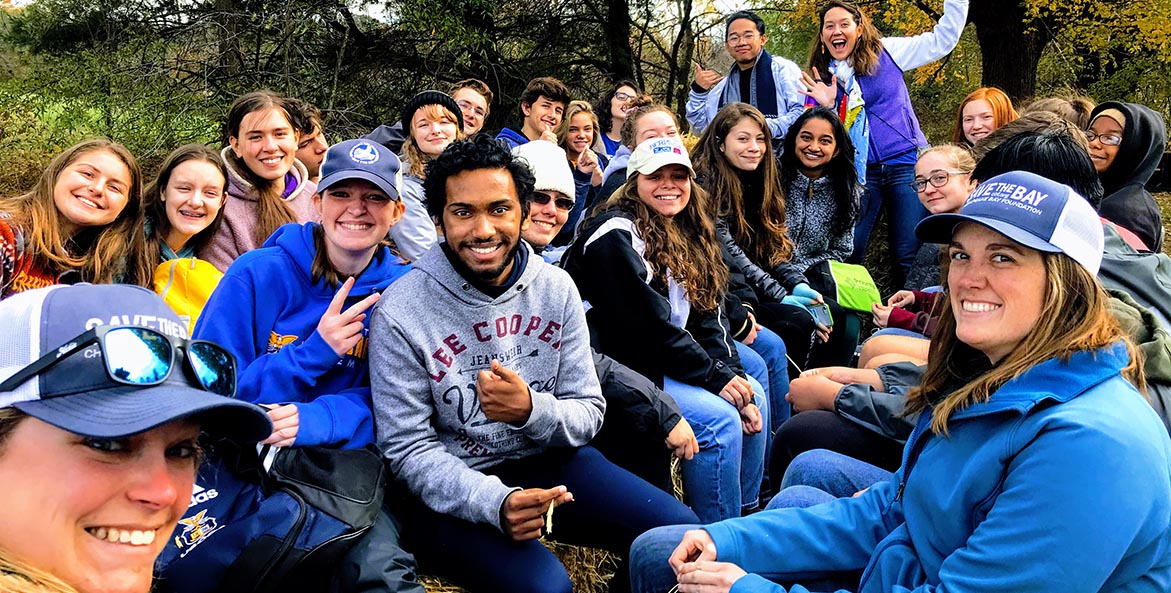They’re much-needed for our community and can serve as a trend-setter for others,” said student leader Kaitlyn Leitherer, from Baltimore.
A group of Chesapeake Bay Foundation student leaders convened this month to try to answer a challenging question: What should a Chesapeake Bay Watershed Outdoor Bill of Rights include?
The answer the group of high school students from Maryland, Virginia, and Pennsylvania came up with were rights they believe should be universal, not only for residents in the Bay watershed, but elsewhere as well.
Their ideas include ensuring the area’s residents have access to environmental education, clean air, clean water, the ability to feel comfortable in nature, and space to grow a garden. The students also called for the right to celebrate the heritage and culture of the watershed.
“We wanted to make sure everyone has fair and equal access to green spaces and everyone can enjoy healthy places in their environment,” said Mallory Kopin, a student leader from Virginia Beach. She said the students first researched other outdoor bill of rights that were created in other areas and drew inspiration from those in creating their own.
One model they used was the newly created Baltimore Children’s Outdoor Bill of Rights, which the city’s mayor, Bernard “Jack” Young introduced in 2019 to ensure the city’s children have access to parks, waterways, and connections to the local ecosystem.
Student leader Eleanor Meckley of Shiremanstown, Pennsylvania, said the right they felt was most needed in the Bay watershed is access to environmental education.
“Environmental education is not consistently available throughout the watershed,” Eleanor said. “In my school there aren’t any mandatory environmental education classes and even the optional ones are a stretch. I’m sure there are other places where students are lacking.”
Another student leader, Connor Ransom of Poolesville, Maryland, pointed out that only about a quarter of the school systems in the watershed are able to provide high quality environmental education, according to the Chesapeake Bay Program.
“I don’t think that’s enough,” Ransom said. “I think that’s a big problem that needs to be addressed.”
The students drafted the Chesapeake Bay Watershed Outdoor Bill of Rights during the 2020 Student Leadership Masterclass hosted by the Chesapeake Bay Foundation’s education department. For five days they collaborated using Zoom to research information, draft their proposed rights, and learn about ways to implement them. They drafted a press release, practiced interview techniques, and talked about next steps.
For one, they considered how these rights could be put in place as a guiding document for the watershed’s residents. To start, they plan to fine tune the rights more and then potentially reach out to government organizations such as state environment or natural resources departments in the watershed to try to implement them. They’re also working to create press materials, graphics, and social media posts to further promote their efforts and spread awareness.
While making the Bay’s Outdoor Bill of Rights a reality will require more work in the future, the students all said they learned several things from the student leadership course.
“Overall, it made me want to make change and take action to improve the environment,” said Kaitlyn Leitherer, a student leader from Baltimore.
Kopin said she learned that it’s easy to forget when you grow up with access to the outdoors and clean water, that not everyone has that same access. She said she wants to make sure everyone does in the future.
For Eleanor Meckley she hopes maybe one day the rights they created in this course will be implemented.
“I like imagining that one day in elementary schools they’ll learn about our Outdoor Bill of Rights,” said Meckley.
Student Created Watershed Outdoor Bill of Rights
CBF student leaders came up with the following rights that they believe everyone in the Chesapeake Bay watershed should have:
- Access to solution-based, environmental education
- Breathe clean air
- Feel welcome, safe, and comfortable in nature
- Free and unlimited access to clean drinking water
- Celebrate and connect to the outdoor heritage and culture of the watershed
- Meditate and relax in peaceful places
- Explore, splash, and play in clean natural waterways
- Have their voice heard in decisions made about natural spaces
- Space to grow a garden where you can plant native seeds and trees
Students interested in participating in CBF’s student leadership program can view more information about how to register and get involved on CBF’s student leadership page. Currently the program is operating remotely due to COVID-19 restrictions. However, students involved in the program typically participate in summer expeditions that include outdoor field experiences.




